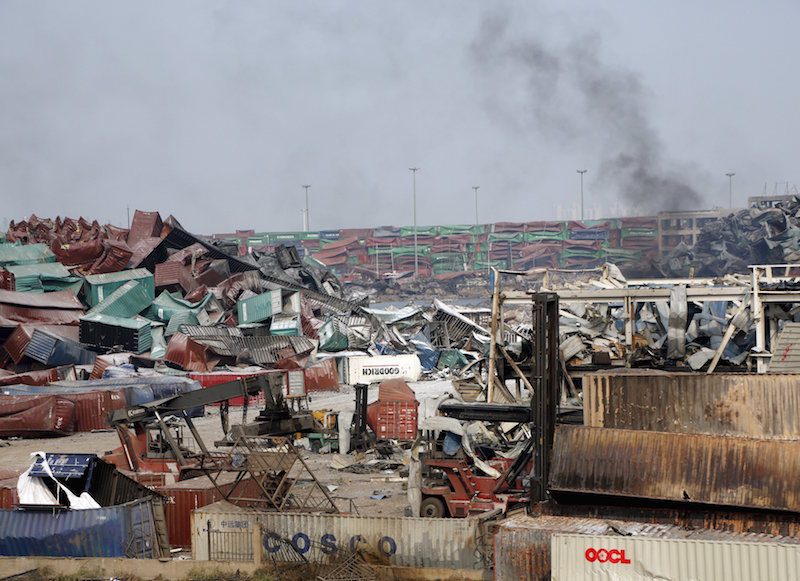Tianjin Blasts Barely a Blip for Marine Insurance Prices
LONDON/FRANKFURT, Jan 7 (Reuters) – Reinsurance rates in the marine sector continued to fall at the start of the year, in spite of the huge cost of explosions at China’s...

Smoke is seen near the site of last week’s explosions at Binhai new district in Tianjin, China, August 17, 2015. REUTERS/Kim Kyung-Hoon
![]() SINGAPORE/SHANGHAI, Aug 17 (Reuters) – Many operations have resumed at China’s Tianjin port, trade sources said, after explosions last week that killed more than 100 people and disrupted business at what is an important oil, gas and bulk import harbour for Asia’s biggest economy.
SINGAPORE/SHANGHAI, Aug 17 (Reuters) – Many operations have resumed at China’s Tianjin port, trade sources said, after explosions last week that killed more than 100 people and disrupted business at what is an important oil, gas and bulk import harbour for Asia’s biggest economy.
The explosions on Aug. 12 led to the disruption of all chemical and oil tanker discharges at the port, and imports of iron ore were also affected.
But shipping data from Reuters on Monday showed that tankers were discharging again, with traders and shippers confirming that operations had restarted over the weekend.
Port officials were not immediately available for comment.
The Tianjin Maritime Safety Administration’s traffic control department said in a statement: “At present, ships apart from those carrying hazardous goods or bunker oil are entering and exiting Tianjin Port’s north section normally. All other berths are operating normally according to sailing plans.”
Reuters spoke to several captains of tankers and dry bulk freighters that are currently in the Tianjin port region, either waiting to discharge or to leave the port, and all said that operations now seemed to be broadly back to normal.
One shipbroker said he had not heard of any problems with oil operations at the port on Monday. “So far, so good,” he said. An oil trader also said he had not heard of any trouble with oil loading at Tianjin on Monday.
Located close to Beijing, Tianjin is one of eastern China’s most important oil and gas terminals, with large commercial and strategic oil storage facilities as well as a floating storage and regasification unit (FSRU) for liquefied natural gas (LNG) imports.
It is also an important point of entry for iron ore, a key ingredient for China’s giant steel-making industry.
A spokesman for Australian ore miner Fortescue Metals Group said: “To date, there has been no impact on Fortescue’s iron ore cargoes going through the Port of Tianjin.”
Traders said the strategic petroleum reserve (SPR) facility at Tianjin had not been affected by the explosion.
China, the world’s biggest crude oil consumer alongside the United States, imports nearly 60 percent of the crude it consumes. It is constructing vast new oil storage sites to build up its strategic reserves so that eventually it will have 90 days’ worth of import demand in stock.
Although ship entries and exits seemed to be returning to normal, shippers said the blasts had worsened the port congestion Tianjin already suffered from.
China Ocean Shipping Company, China’s largest shipping group, said its ships anchored at Tianjin had not been affected but that some of its facilities in the area suffered varying levels of damage.
Singamas Container Holdings Ltd said its logistics depot had temporarily suspended operation. (Reporting by Asia commodities team; Editing by Alan Raybould)
(c) Copyright Thomson Reuters 2015.
This article contains reporting from Reuters, published under license.

Sign up for gCaptain’s newsletter and never miss an update

Subscribe to gCaptain Daily and stay informed with the latest global maritime and offshore news
Essential news coupled with the finest maritime content sourced from across the globe.
Sign Up